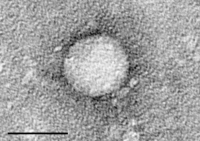
Photo from wikipedia
Young people who use drugs have a rising hepatitis C (HCV) incidence in the United States, but they may face barriers to testing and treatment adoption due to stigma. We… Click to show full abstract
Young people who use drugs have a rising hepatitis C (HCV) incidence in the United States, but they may face barriers to testing and treatment adoption due to stigma. We conducted a cross‐sectional study of New York City residents aged 18‐29 years who reported non‐medical prescription opioid and/or heroin use in the past 30 days. Participants were recruited from the community between 2014‐2016 via respondent‐driven sampling. Participants completed an in‐person structured survey that included questions about HCV testing and treatment and received HCV antibody testing. There were 539 respondents: 353 people who inject drugs (PWID) and 186 non‐PWID. For PWID, median age was 25 years, 65% were male and 73% non‐Hispanic White. For non‐PWID, median age was 23 years, 73% were male and 39% non‐Hispanic White. 20% of PWID and 54% of non‐PWID had never been tested for HCV (P < .001). Years since first injection (aOR 1.16, CI: 1.02‐1.32, P = .02) and history of substance use treatment (aOR 3.17, CI: 1.53‐6.61, P = .02) were associated with prior testing among PWID. The seroprevalence of HCV among PWID was 25%, adjusted for sampling weights. Of the 75 who were aware of their HCV‐positive status, 53% had received HCV‐related medical care, and 28% had initiated treatment. HCV prevalence among young PWID is high, and many have never been tested. Injection experience and treatment engagement is associated with testing. Interventions to increase testing earlier in injection careers, and to improve linkage to HCV treatment, will be critical for young PWID.
Journal Title: Journal of Viral Hepatitis
Year Published: 2020
Link to full text (if available)
Share on Social Media: Sign Up to like & get
recommendations!